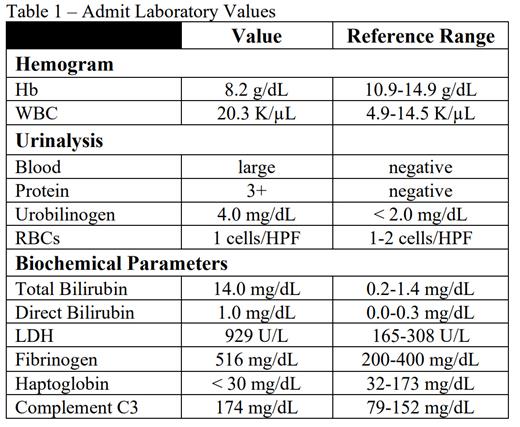Background
Paroxysmal Cold Hemoglobinuria (PCH) is a rare autoimmune hemolytic anemia (AIHA) that is often seen as a sequela of viral upper respiratory tract infections and immunizations in children. It is characterized by a positive Coombs test with a biphasic auto anti-P IgG known as the “Donath-Landsteiner antibody,” which sensitizes red cells and fixes complement at 0-4°C, and hemolyzes red cells near body temperature. The mainstay treatment of PCH includes cold avoidance, intravenous hydration, and supportive blood transfusions. Glucocorticoids may be used in the setting of significant hemolysis, with debated efficacy. We present a case of steroid-refractory PCH in a 6-year-old boy secondary to human rhinovirus/enterovirus.
Methods
Patient clinical data was abstracted from the electronic medical record. Blood bank testing was performed through the in-house blood bank. Donath-Landsteiner testing was performed at a reference laboratory.
Findings
A 6-year-old male with a history of mild upper respiratory tract infection 1 week prior presented to the emergency department with abdominal pain, dark urine, and jaundice. Initial laboratory evaluation uncovered anemia with hemoglobinuria, hyperbilirubinemia, elevated LDH, and decreased haptoglobin, raising concerns for acute hemolytic anemia (Table 1). Follow-up blood bank testing revealed a cold autoantibody. Viral PCR was positive for human rhinoenterovirus.
Despite supportive therapy through intravenous fluids and warming, the patient's anemia worsened significantly (Hgb 5.1g/dL) and packed red blood cell (pRBC) transfusion was required. Methylprednisolone 0.8 mg/kg IV twice daily was initiated as empiric therapy for autoimmune hemolysis without significant improvement. Blood was sent for Donath-Landsteiner antibody testing at a reference laboratory and revealed a bi-phasic hemolysin consistent with paroxysmal cold hemoglobinuria. The patient required an additional pRBC transfusion and was discharged after 4 days inpatient.
Conclusion
Our case supports a growing body of evidence that finds steroid therapy inefficacious in the treatment of hemolysis in the setting of PCH.
Disclosures
No relevant conflicts of interest to declare.


This feature is available to Subscribers Only
Sign In or Create an Account Close Modal